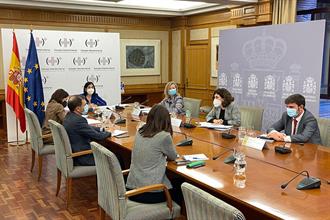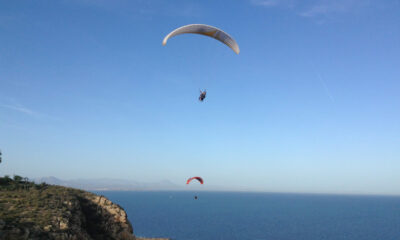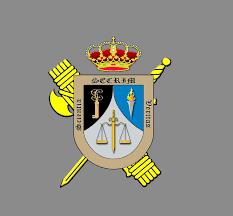

Covid
Sporting events to have capacity restrictions of 75% outdoors and 50% indoors
In this way, a maximum capacity of up to 75% is established (currently it is 100%) for events in open venues and a maximum capacity of up to 50% (currently it is 80%) for events in closed venues, respecting the Non-pharmacological protective measures against COVID-19.
This was reported by the Minister of Health, Carolina Darias, at a press conference after the holding of this plenary session where different aspects of the pandemic and vaccination situation were analysed. At the press conference, she was accompanied by the director of the Carlos III Health Institute, Cristóbal Belda, who informed the CISNS of the results of the CIBERES-UCI-COVID study.
Vaccination and Defence support

Minister Carolina Darias highlighted the important boost that all autonomous communities and cities are giving to vaccination and have achieved, among all, the goal that before the end of the year, 80% of people over 60 years have the dose already.
“I want to thank and acknowledge the work of all the autonomous communities and cities, staff from the Ministry, the Spanish Agency for Medicines and Health Products, the Carlos III Health Institute and the health personnel, mainly nursing, for having made it possible. And, of course , to the Spanish citizenship “, valued Darias.
“Vaccination is a key objective in this fight against the virus. Therefore, our efforts to continue increasing the vaccination campaign, especially with priority booster doses,” defended Darias. In this sense, she reported the effective implementation of another of the measures announced by the President of the Government on the 22nd: the making available to the autonomous communities of 150 mobile vaccination teams from the Ministry of Defence.
As detailed, until yesterday, a total of 13 autonomous communities, together with Ceuta and Melilla, have requested the incorporation of these teams and today Mobile Vaccination Teams have already been activated in Seville, Córdoba, Almería and Melilla.
Added to this measure is the making available to the autonomous communities of the military hospitals ‘Gómez Ulla, Centro Sanitario de Vida y Esperanza’, in Madrid and the General Hospital de la Defensa de Zaragoza where it has been vaccinated since yesterday.
Modification of the isolation period in positives for COVID-19
The minister also released the decision of the Public Health Commission regarding isolations and quarantines. “Today it was unanimously agreed, by all the people who are part of the Public Health Commission, to reduce the period of isolation of people with a positive active infection test to 7 days,” the minister explained.
In this way, people positive for COVID-19 will have to do an isolation of 7 days instead of the current 10. Contacts that require quarantine (that is, those unvaccinated people who are close contact of a positive) also reduce their period of quarantine to 7 days.
The Minister of Health also insisted that vaccination and prevention are important at this time. “Vaccinate, vaccinate and vaccinate and prevent, prevent and prevent remain our maxims,” insisted Darias who reiterated the importance of maintaining non-pharmacological measures such as safety distance, proper use of masks, ventilation or washing of frequent hands, among others.
Finally, Darias reported on the celebration, on January 4, of a joint meeting of the SNS Interterritorial Council with the Education Sector Conference and the General Conference on University Policy.
“The educational model of presence in the classrooms is a success. The classrooms are safe spaces,” said the minister, recalling that, in our country, “in the worst moments we have been able to allow the right to face-to-face education.”
CIBERES-UCI-COVID Study
For his part, the director of the ISCIII, Cristóbal Belda, explained the results of the CIBERES-UCI-COVID study, one of the most outstanding projects of the COVID Fund that, since April 2020 has financed 129 investigations on SARS-CoV-2 and the COVID-19.
This month this work is concluded after having studied between 2020 and 2021 more than 6,000 admitted for COVID-19 in 69 Intensive Care Units of Spanish hospitals.
This research, coordinated by the CIBER for Respiratory Diseases (CIBERES) of the ISCIII, has studied the relationship between the detection of SARS-CoV-2 in the blood of patients and the severity of the disease. “Their results indicate that both the presence of the virus, detected by searching for mRNA and antigens in the blood, as well as the absence of antibodies against the virus, are factors that make it possible to predict the severity of the disease.
Having this knowledge allows, together with the clinical characteristics that accompany COVID-19 (age, other diseases, etc.), “to improve the ability to manage and treat the disease in critically ill patients,” said Belda.
CIBERES-UCI-COVID has also provided keys to try to personalize the therapies against COVID-19, both with currently available treatments -corticoids, for example- and with options that in the future could be useful to treat the disease, such as drugs antivirals and monoclonal antibodies.
The National Health System has the necessary technology to identify these severity markers and optimize the best management of patients, facilitating the start of treatment.
Other results of this project have revealed that, a year after hospital discharge, around 1% of the patients with COVID-19 who had been in the ICU have died. In addition, the mortality of these patients admitted to intensive care has been 31%.
The CIBERES-UCI-COVID project is led by the head of the CIBERES group at the Hospital Clínic de Barcelona, Antoni Torres, supported by Dr. Ferrán Barbé, Director of CIBERES, as well as by Dr. Jesús Bermejo, of the Institute of Biomedical Research of Salamanca.
The project is part of the research launched through the COVID-19 Fund throughout 2020, managed by the Carlos III Health Institute (ISCIII) and received a total funding of 1,750,000 euros. It has also had the support of the Spanish Society of Intensive, Critical Medicine and Coronary Units (SEMICYUC) and the Spanish Society of Pulmonology and Thoracic Surgery (SEPAR), the Salamanca Biomedical Research Institute, as well as the participation of Barcelona Supercomputing Centre (BSC).
-

 Driving in Spain2 weeks ago
Driving in Spain2 weeks agoHow Long Does it take to Receive a Traffic Fine Through the Post?
-

 News2 weeks ago
News2 weeks agoYour Task for This Week is to Seek Out a Monument – The Week Ahead
-

 Health1 week ago
Health1 week agoQuirónsalud Elche and Quirónsalud Gran Alacant strengthen their services with the incorporation of a new team specialised in advanced ophthalmology
-

 Court News1 week ago
Court News1 week agoMan in court accused of trying to kill ex-partner with an axe




















